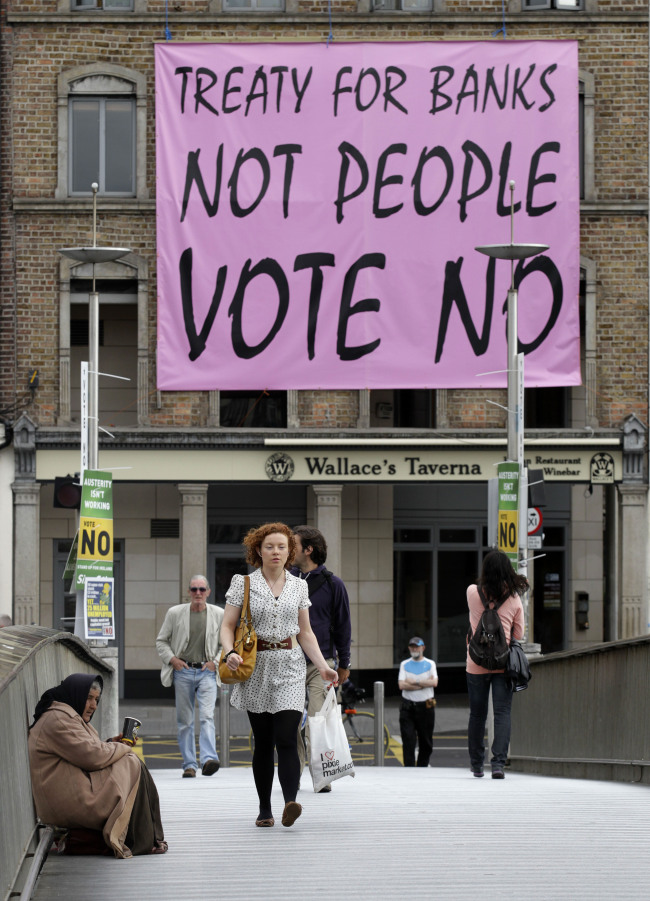DUBLIN (AFP) ― Ireland is to vote in a referendum Thursday on a key EU pact designed to shore up the troubled eurozone, amid signs that a clear majority will vote to approve it.
In the only referendum expected on the fiscal pact, which all 27 EU members have signed except Britain and the Czech Republic, polling stations were due to open at 7:00 a.m. and close at 10:00 p.m.
The vote on the German-backed pact, which would penalize countries that sign up if they fail to keep their debts in check, will be closely watched as a “no” vote could give momentum to the growing European backlash against austerity measures.
But four final opinion polls at the weekend suggested around 60 percent of the 3.1 million voters would back the treaty, and leading bookmaker Paddy Power has offered odds of 1/25 on a “yes”, meaning it thinks it is a near certainty.
 |
A poster hangs from a building calling for people to vote NO in the upcoming European Fiscal Treaty in central Dublin on Tuesday. (AP-Yonhap News) |
The Irish government has warned voters that it would only be able to get guaranteed financial help from the European Stability Mechanism (ESM), the EU’s new permanent bailout fund which comes into force in July, if voters ratify the treaty.
Two years after Ireland was forced to seek an 85-billion-euro ($106 billion) bailout from the EU and International Monetary Fund, and with ministers warning they may well have to access the ESM, the message has struck a chord with voters.
“People argue that you’d vote ‘yes’ out of fear and ‘no’ out of anger, but it’s a bit more complicated than that,” Michael Marsh, politics professor at Trinity College Dublin, told AFP.
“There’s some trust in what the government’s saying, that you’d just be silly not to vote yes,” he added.
On the eve of voting, Irish Prime Minister Enda Kenny said that by ratifying the pact Ireland would be sending a signal that it will “never run riot with the people’s money again”.
“This is about stability, bringing confidence to the euro,” Kenny said as he campaigned at a Dublin railway station, adding that a ‘yes’ vote would show Europe that Ireland could lead by example.
“When we take over the EU presidency next year we want to be very effective,” he told AFP. “A strong ‘yes’ vote adds to the respect and our credibility with our colleagues in Europe.”
Hoping to harness public anger against the spending cuts and tax rises brought in after the bailout, the pact’s Irish critics have labeled it an “austerity treaty” as it ultimately empowers the EU to fine countries that overspend.
“We know that austerity doesn’t work, and that’s increasingly what people are saying in mainland Europe,” Gerry Adams, leader of Sinn Fein, the main party opposing the pact, told reporters outside Ireland’s parliament on Wednesday.
With a third of the electorate still undecided, there is still a possibility that Ireland could deliver a shock “no” vote, as it has done in two previous EU referendums.
Since the fiscal pact will come into force after just 12 countries have ratified it, and with four having done so already, an Irish rejection of the treaty would not be enough to bring it to a halt.
But it would fuel a growing campaign led by France’s new President Francois Hollande for Europe to focus on growth rather than belt-tightening as the cure for its economic crisis.








